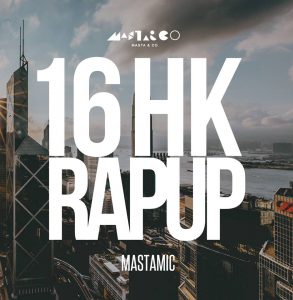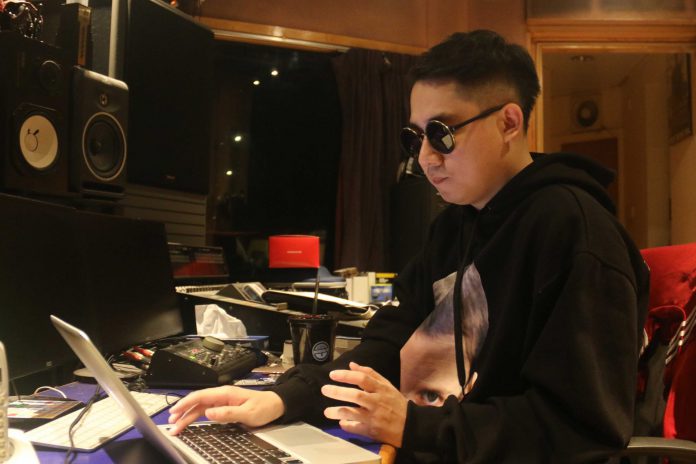Hip-hop artist MastaMic brings book learning and fine art into the mix
By Jennifer Leung
In a studio located in the same buildings as three hourly “love” hotels, a man in a hoodie and a pair of big round black-framed sunglasses is editing the tracks of a new song in front of two computer screens.
The unassuming studio, known as 2nd Floor Back Suite after an album by legendary local rock band Beyond, is rich in Hong Kong music history. This, after all, is where Beyond spent most of their time producing music and this is where the man in the glasses, rapper MastaMic, holds sway – at the invitation of Beyond’s Yip Sai-wing, who owns the place.
MastaMic, or Master of Microphone, is a 30-year-old Cantonese rapper. For those who have watched RTHK’s satirical show on current affairs, Headliner, MastaMic is the voice behind many of the rap songs skewering local politics.

MastaMic first got into hip-hop at secondary school. His friends were listening to Suede and Oasis, but he was more attracted to the wave of hip-hop music hitting Hong Kong at the time, through artists like Eminem and local outfit LMF, in addition to the associated skateboard culture.
He says there is nothing in particular about his childhood experiences that directed him towards becoming a rapper. But a breakdown in his relationship with his family set a series of events in motion that pushed him towards his current path.
MastaMic grew up in a traditional Chinese family and his parents had high expectations for him. He got satisfactory grades in the public exams but his rebellious nature landed him in trouble at school. He was not exactly expelled, but, “my school used another way to kick me out of school by suggesting that I leave school myself,” he says.
This created a huge conflict with his family, which he thinks was because they thought he had brought shame upon them. “My dad was very determined to kick me out,” he says. Ironically, MastaMic thinks his estrangement from his family relieves him from the pressure of conforming to other people’s expectations. He says many young musicians tell him their families hold them back from pursuing their dreams.
After staying at a hostel for a while and then with relatives, MastaMic eventually continued his studies in the Mainland through a government-sponsored scheme. He attended Wuhan University, where he studied law. “It is rubbish. It has no meaning to me,” he says. He spent most of his time rapping in his room. In his third year, he decided to abandon his degree.
“I heard a voice telling me that I should be a rapper,” he says. At first he was not sure if he really had the commitment but the voice would not go away. He dropped out and returned to Hong Kong.
Without academic or professional qualifications, MastaMic had to push forward with his plan. “I got no choice man!” he exclaims. He started out by busking in Mong Kok’s Sai Yeung Choi Street. Hong Kong audiences had not seen freestyle rappers performing in the street before. He says they had no idea what he was doing. “They were just watching a circus,” he says.
MastaMic says Hong Kong audiences did not respect rapping as an art form and the situation still has not changed. He gets annoyed when he performs in shows where he is asked to rap about anything on demand, including about other participants. “Why don’t you ask [Cantopop group] Supper Moment to sing about the guests?” he says.
It all stems from a lack of respect for and understanding of hip-hop that extends to the music industry. MastaMic was invited to join a record label, CMD, in 2008 but it was a move he regrets because the company was not willing to invest resources to nurture him. Disappointed, he left the record label and started his own, Masta & Co., with a mission to promote urban music in Hong Kong and aid the development of urban music.
In striking out on his own, he trades resources for freedom. The budget for production is tight and he always has to strike a balance between artistic choices and financial constraints. The small scale of the company also makes it harder to reach out to different media and other organisations. Not that it is ever easy to promote hip-hop in Hong Kong, something that is a source of frustration for MastaMic. “Zero, it is zero,” he says when asked if there is a supportive environment for the genre in Hong Kong.
“Hong Kong people don’t accept Hong Kong hip-hop, but they do accept Korean hip-hop,” he says.
He recalls that once, when he was performing in a bar, the audience started heckling and hissing when the host introduced him as a Cantonese rapper. “Most of you are from Hong Kong. What are you grumbling about?” he countered.
Unlike South Korea and Japan, he says hip-hop may have never taken root in Hong Kong because there has been less influence from American culture. South Korea and Japan both have American military bases with military personnel stationed there. In contrast, he says Hong Kong was a British colony and has been more influenced by British and European art and culture.
Making music in Hong Kong is one thing; making a living from making music in Hong Kong is another. MastaMic works with other artists and for commercial clients. He says clients put many constraints on the work, such as the content and length. While fulfilling his clients’ demands, MastaMic insists on keeping his style in every product. “Why are a lot of raps in other advertisements screwed up? Because they only listen to the client.”
MastaMic is perhaps best known to general audiences for his popular annual music series, Rap Up, which he started in 2008. It consists of a “wrap-up” track that summarises the key news and developments of the year. Rap Up has been well-received but also attracted criticism for being a bit stale in recent years. He dismisses such barbs, explaining that outsiders cannot understand the difficulties and limitations as they are not involved in the process.
It takes MastaMic a month to complete his opus. He has to sift through a mountain of news and decide what to include. Then he has to describe each item in around two sentences – including the what?, where?, when?, who? and why? , as well as adding his own comments. On top of that he has to keep tabs on the speed and length of the track, and how that will be perceived by listeners. There is a lot of work involved in each Rap Up and next year will probably see the last in the series.

“I decided a few years ago that I would do 10 of them … to be honest I’m beginning to feel a bit bored and well, I think I’ve achieved something in looking at the changes in Hong Kong over 10 years,” he says. “I feel I shouldn’t let it become my own comfort zone.”
He adds that Rap Up is not produced with a hip-hop audience in mind, or any particular age group, and that for MastaMic is the point. For him, hip-hop is many things to different people – it can be gangsta rap, it can be socially conscious, it can be about love and peace. He says hip-hop is a culture that can be expressed in different ways depending on the creator of the words and music.
In his upcoming album, he wants to put a popular spin on rap music, make it easier to listen to for the non-purists. “In the past, I tried make popular music ‘hip-hop-ised’, now I want to make hip-hop as a kind of music more popular,” he says. He reveals there will be some gospel elements as well as tropical house.
MastaMic gets his inspirations from everywhere. He says he has always loved to think deeply about a variety of subjects since he was young. For instance, he used to question why you have to pay for textbooks when the authors did not discover or invent the knowledge in them.
Even now, he is enthusiastic about exploring new things. He started reading books that analyse the Bible, which is the inspiration for so much art and music. “I followed hip hop, then soul, funk, jazz, classical and I eventually came across the Bible,” he says.

He says he is currently reading the Japanese sci-fi manga Hellstar Remina by Junji Ito and What Are You Looking at? 150 Years of Modern Art in the Blink of an Eye by Will Gompertz. The two works are completely different but MastaMic says he cannot say which is better; he believes the combination of the two creates space for new ideas.
He is also interested in philosophy and has put some philosophical elements in his music. He has a song called Yin Guo, which refers to cause and effect or karma in Buddhism.
But he says this kind of song is not as popular with listeners. “People do not listen to this kind of song with deeper meanings,” he says.
Apart from showing his intellectual and spiritual rapper side, MastaMic also humorously plays up the materialist rapper side. He says he is looking forward to his upcoming concert in August and hopes to put on a good show with strong hip-hop elements.
“The idea is that people enjoy it and also that they buy lots of tickets and merchandise, so I can buy more sneakers. Coming up I want to buy a car, I want to buy a flat. I hope to crowdfund through my concert,” he jokes. After all, he adds, “if John Tsang can crowdfund millions of dollars to support Article 23, then I should be able to crowdfund a little bit after all my hard work in producing music.”
Edited by Eunice Ip











































